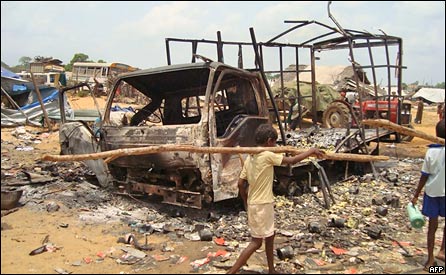Ilankai Tamil Sangam30th Year on the Web Association of Tamils of Sri Lanka in the USA |
|||
 Home Home Archives Archives |
Move On From the TigersGlobe and Mail editorial, Ottawa, February 25, 2010
See also May 23, 2009 discussion between UK Tamil Janani Paramsothy & ex-IRA member Tommy McKearney here, "When is it right to give up the fight?", the implications of armed struggle. 
Play in either Real OR Windows Media players --------------------------------- Tamils around the world feel defeated, and a vindictive Sri Lankan government, not sated by victory in a civil war, continues its oppressive ways at home. The Tamil diaspora may despair, but it must also come to terms with a choice: to revive the hopeless cause of the Liberation Tigers of Tamil Eelam, or to renounce violence and work for justice and reconciliation in Sri Lanka. Evidence that much of the diaspora is out of touch and unready to make that choice comes from a new report by the International Crisis Group. It shows a community still in thrall to the LTTE and its dead leader, Vellupillai Prabhakaran. Organized votes in several countries, including Canada, have repeated a call for an independent Tamil state. Fundraising networks that the LTTE used to buy weapons still exist, and could be reactivated for violent purposes, while new organizations do not command loyalty. Some diaspora members want to prosecute Sri Lankan officials for war crimes, but don't acknowledge the abuses perpetrated by their own leaders. The diaspora is undermining the efforts of its brethren at home. Diaspora leaders rejected the Tamil National Alliance, a Tamil political party in Sri Lanka, when it endorsed Sarath Fonseka in last month's presidential election. Meanwhile, the U.S. Supreme Court this week heard a case that could narrowly define the amount of aid and advice that can be given to terrorist organizations in the name of humanitarian assistance. That could cut off any flirtations with the LTTE and its successors. But the diaspora has an opening. The government's mistreatment of Tamils after the war's end and the recent detention of Mr. Fonseka and opposition journalists are unquestionable outrages; they demand more international attention. The diaspora can push Western governments and the UN to be more aggressive in their dealings with the government, and can call for a comprehensive investigation into abuses committed by both sides during the civil war. Harini Sivalingam, the policy director of the Canadian Tamil Congress, says the report wrongly paints all overseas Tamils with the same brush. She points out, for instance, that the CTC took the lead from elected Tamils in Sri Lanka who supported Mr. Fonseka's candidacy. That said, the dream of many Canadian Tamils for a truly independent homeland is dead. Moving from armed resistance to tough-minded politics, especially after such a brutal and futile conflict, will not be easy. But it will be right. |
||
|
|||